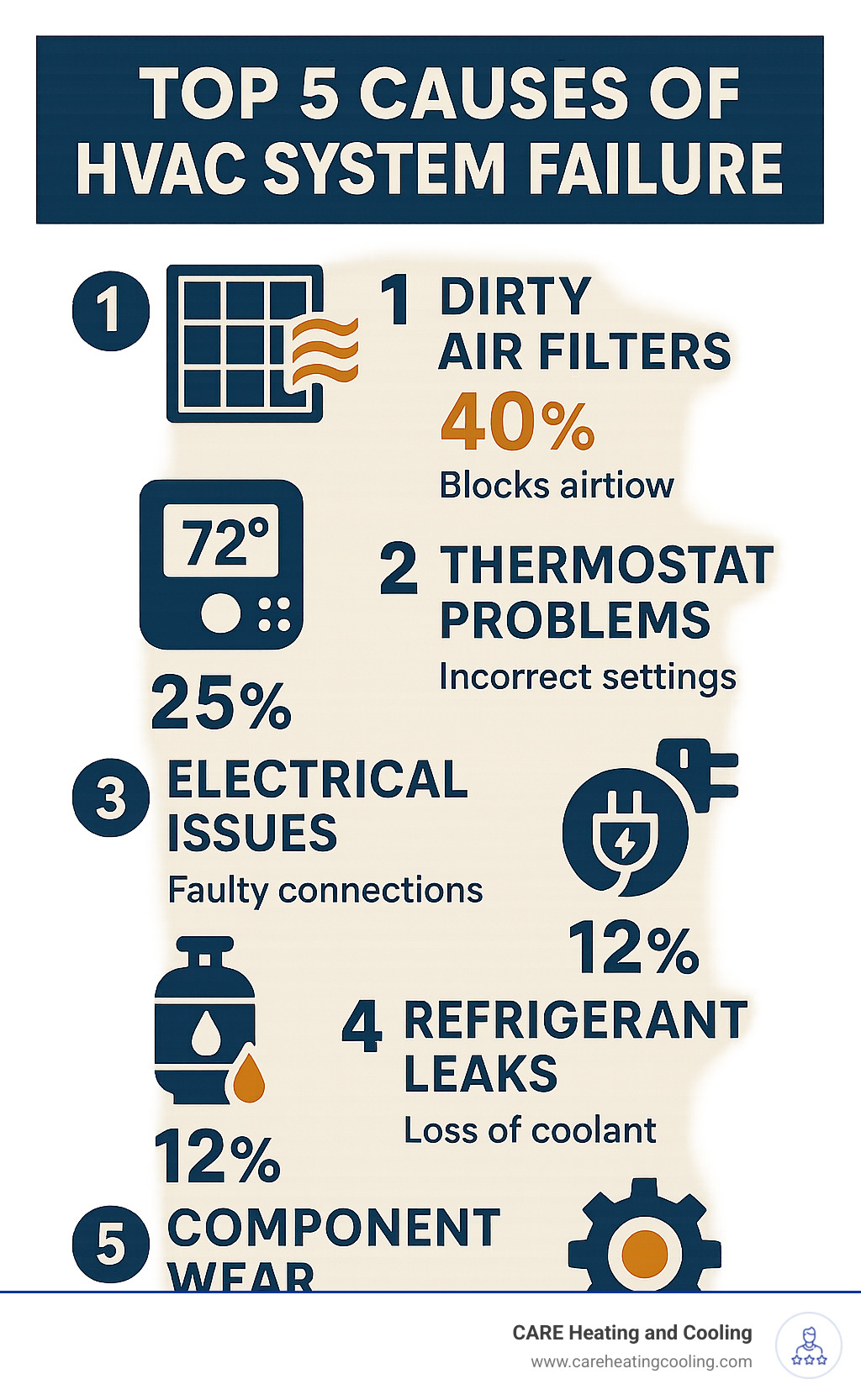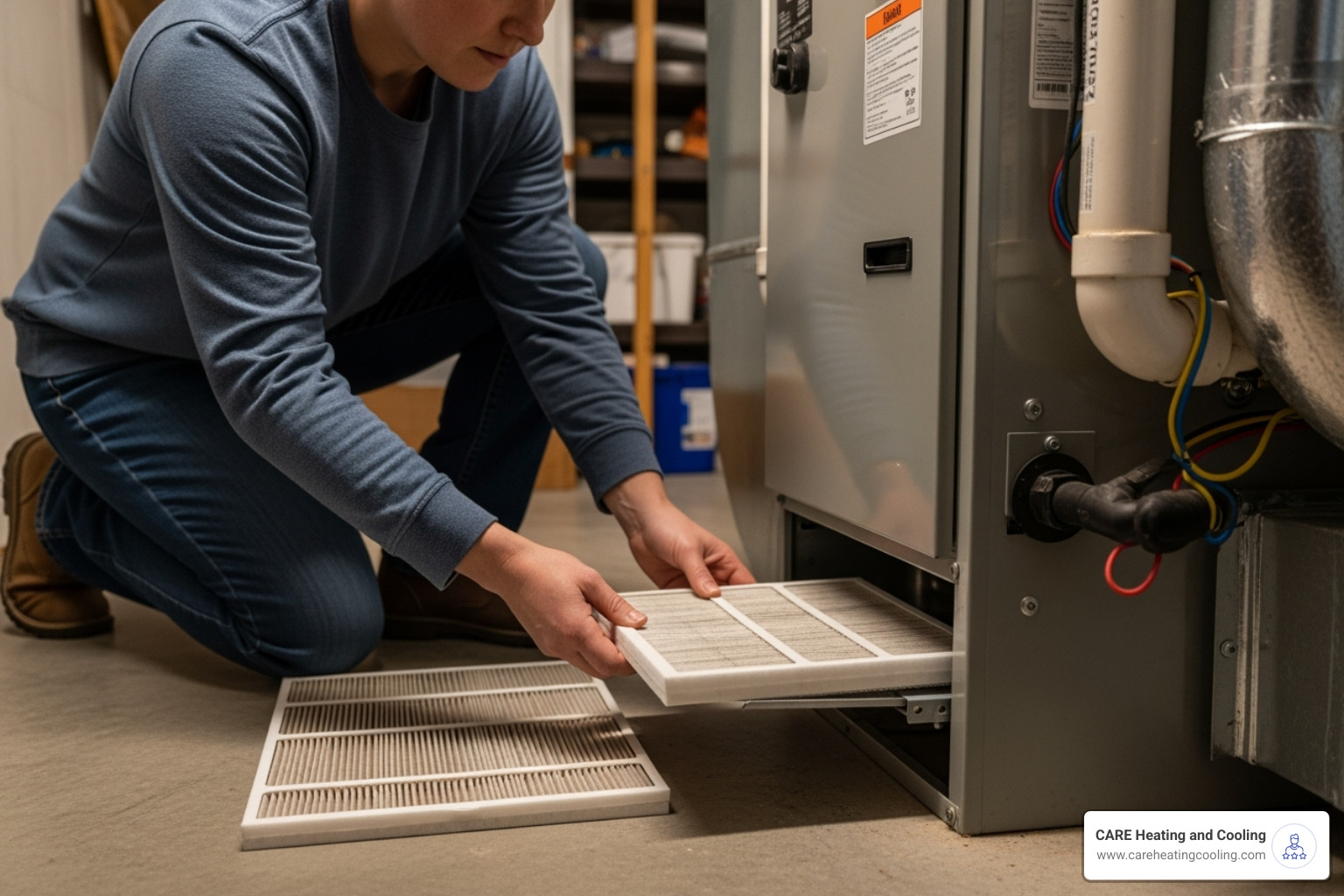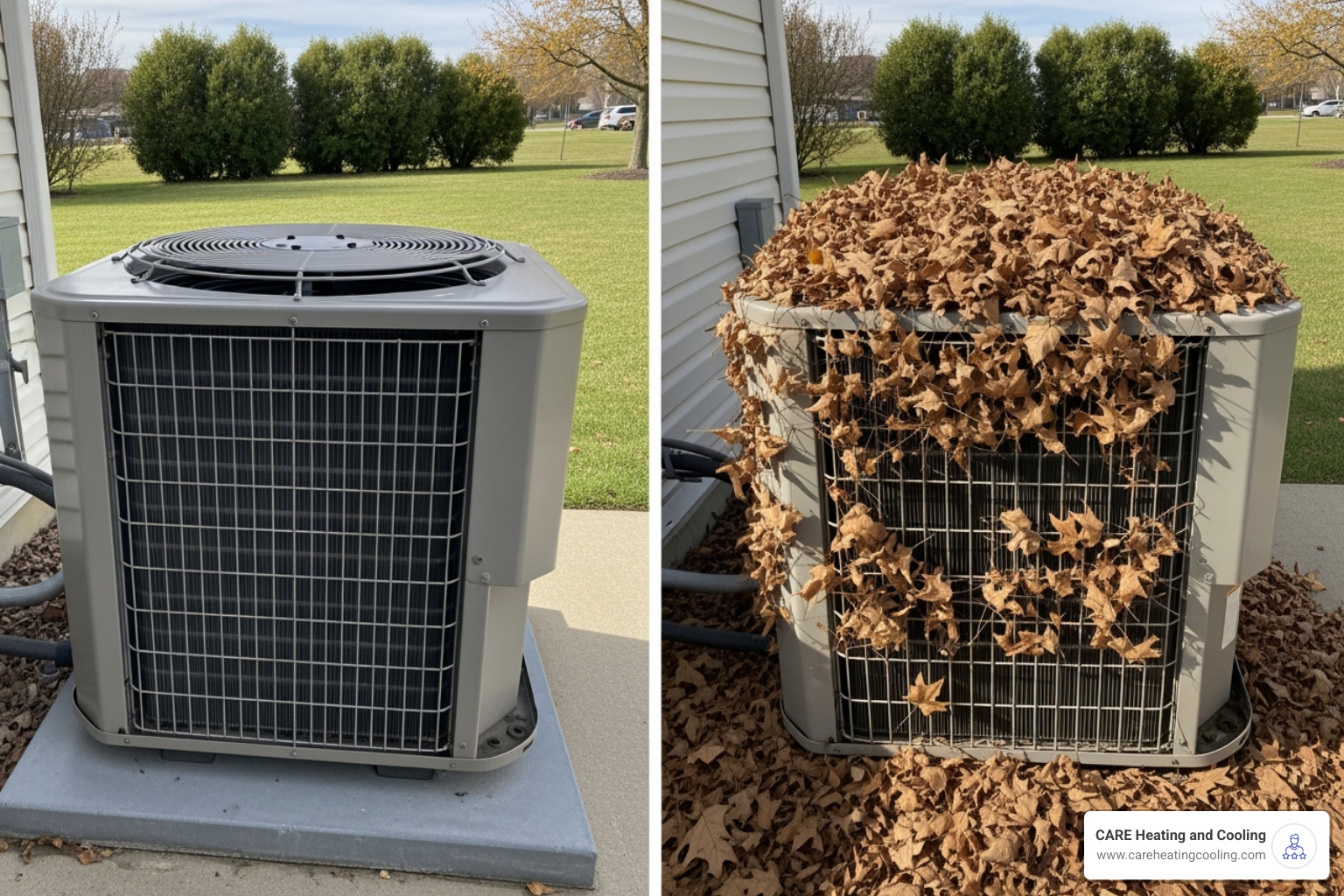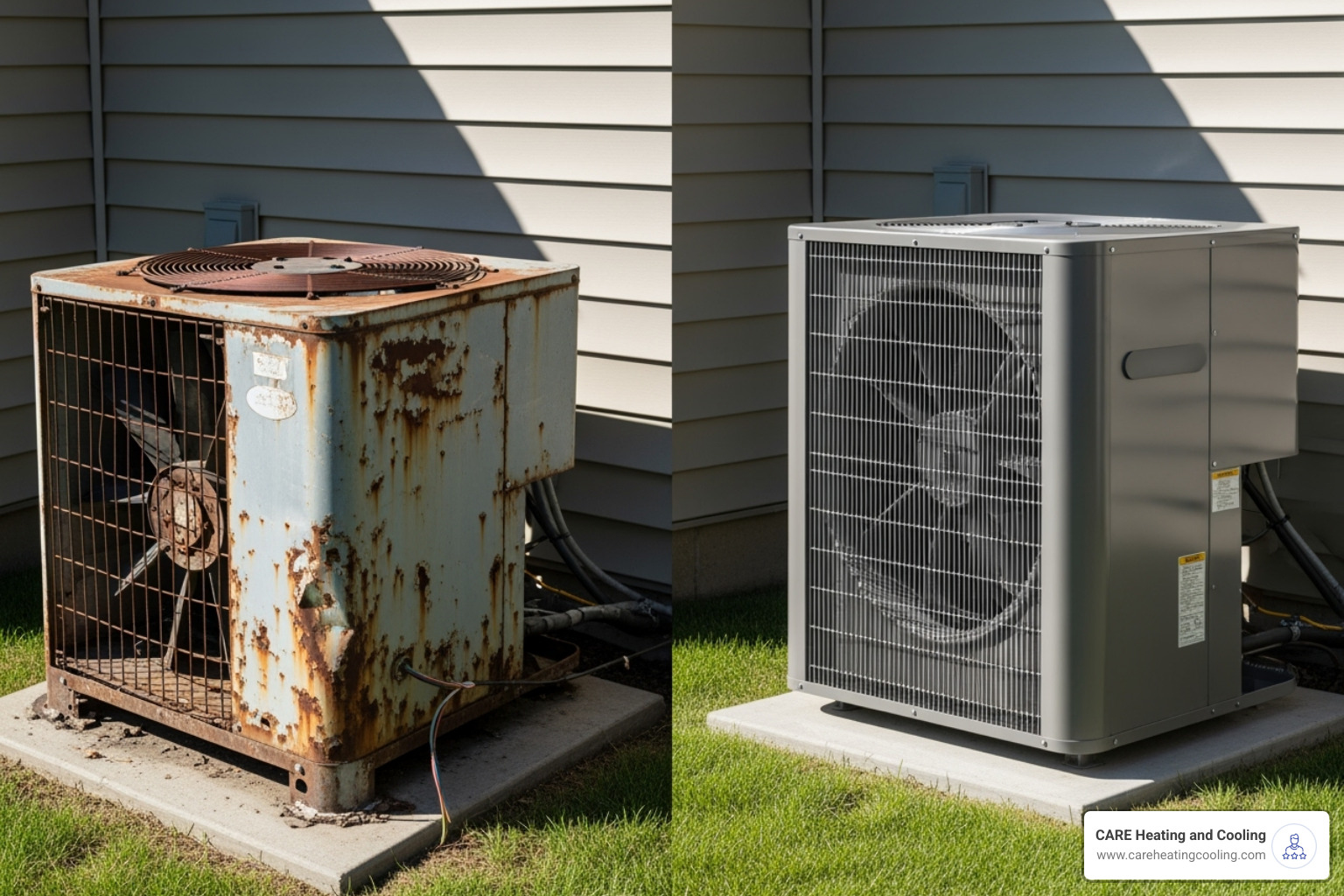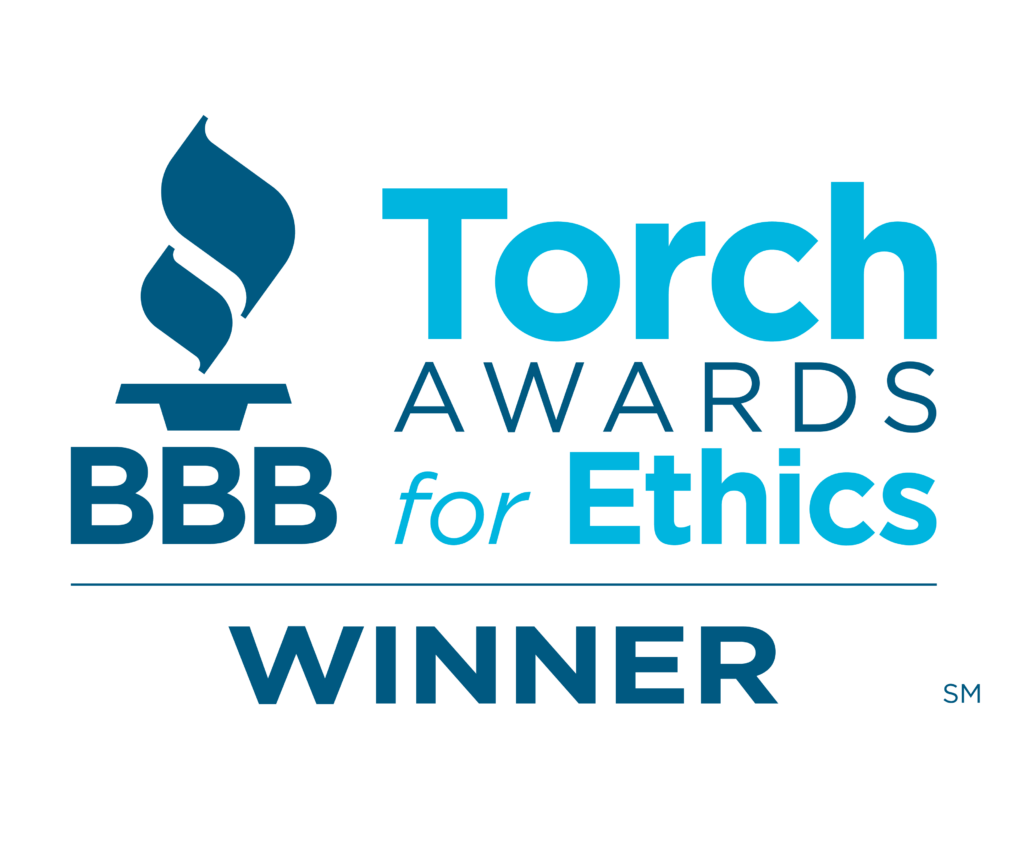When Your Home’s Comfort System Lets You Down
HVAC system failure can quickly turn your home from comfortable to unbearable. Whether it’s a sweltering summer or a freezing winter, a broken system demands immediate attention.
Common causes of HVAC system failure include:
- Dirty air filters – blocks airflow and forces the system to work harder
- Thermostat problems – incorrect settings or dead batteries
- Electrical issues – tripped breakers or blown fuses
- Refrigerant leaks – reduces cooling capacity and damages components
- Component wear – failed motors, compressors, or other mechanical parts
The good news is that many failures stem from simple issues you can fix yourself, saving you time and money.
When to call a professional:
- Strange noises like banging, hissing, or grinding
- Burning or gas odors
- System won’t turn on at all
- Water leaking around the unit
- Frequent cycling on and off
According to research, heating and cooling costs about 54% of your utility bill. When your system fails, acting fast prevents small problems from becoming expensive disasters.
The key is knowing what to handle yourself and when to call a pro. While changing filters or checking the thermostat are safe DIY fixes, complex issues with refrigerant, electrical parts, or gas systems require professional expertise.
First Steps: Simple HVAC Troubleshooting You Can Do Yourself
When your heating and cooling system stops working, it’s easy to assume the worst. But before you panic and call for emergency service, know that many HVAC system failures start with simple problems you can fix in minutes. Walking through these basic troubleshooting steps can often restore your home’s comfort and save you time and money.
Check Your Thermostat
Your thermostat is the brain of your HVAC system, so start there. What seems like a major HVAC system failure could be a simple hiccup.
- Check the batteries: If the display is blank or flickering, try replacing the batteries, as many hardwired models use them for backup.
- Verify settings: Ensure the thermostat is in the correct mode (“cool” or “heat”) and set to your desired temperature. It’s easy for settings to be changed by accident.
- Review the schedule: For programmable thermostats, check that the schedule still fits your routine. The system might be following an outdated program.
For persistent issues or better control, consider upgrading to a smart thermostat for better efficiency. You can also find more guidance on common HVAC problems and thermostat issues.
Inspect Air Filters and Airflow
Dirty air filters are a leading cause of HVAC system failures, but they are easy to fix. A clogged filter chokes airflow, forcing your system to work harder. This strain can lead to overheating, frequent cycling, or a complete shutdown. Restricted airflow also worsens poor indoor air quality and can cause evaporator coils to freeze. The consequences of dirty air filters are significant.
Locate your filter (usually near the furnace or in a return vent) and check it. If it’s dirty, replace it. We recommend changing filters every 1-3 months, more often if you have pets or allergies. Also, ensure all vents and registers are unblocked by furniture or other items, as blocked vents create hot and cold spots and strain your system.
Address Basic Electrical Issues
An apparent system failure might just be a power issue. Before assuming the worst, check for basic electrical problems.
Go to your electrical panel and find the breaker for your HVAC system. If it’s tripped (in the middle or “off” position), you’ve likely found the issue. A tripped circuit breaker is a protective measure. To reset it, flip it fully to “off,” then back to “on.” Some outdoor units also have a reset button.
Important: If the breaker trips again immediately, do not keep resetting it. This signals a more serious problem, like an overworked system or an electrical fault. Our guide explains why your AC trips the circuit breaker. Safety comes first with electrical issues; if the problem persists, call a professional.
Examine the Outdoor Unit
Your outdoor condenser unit collects debris that can cause an HVAC system failure. Inspect it for leaves, grass clippings, or other obstructions blocking airflow. Ensure there is at least two feet of clearance around all sides of the unit so it can “breathe” properly. Overgrown plants or stored items can restrict airflow and reduce efficiency. Also, check the delicate metal fins on the sides. If they are bent from debris or hail, it can hurt your system’s performance.
Recognizing Warning Signs of a Major HVAC System Failure
Your HVAC system gives warning signs before a complete HVAC system failure. Recognizing these red flags can save you from major headaches and expense. While some issues are simple DIY fixes, the symptoms below point to deeper problems that require a professional. Ignoring them often leads to more expensive repairs.
Unusual Noises and Foul Odors
A quiet hum is normal, but loud noises or strange smells signal trouble.
- Banging or rattling: Suggests a loose or broken part, like a fan blade or motor.
- Squealing or screeching: Often indicates a failing motor bearing or a worn fan belt.
- Hissing or bubbling: A classic sign of a refrigerant leak.
- Buzzing: Points to electrical issues like a failing capacitor. Learn more about why your AC is making buzzing noises.
Pay attention to odors as well:
- Musty smells: Indicate mold or mildew in the system, affecting air quality.
- Burning odors: Signal a serious electrical problem. Turn off your system immediately.
- Rotten egg smell: This means a potential natural gas leak. Evacuate your home and call your gas provider and emergency services right away.
Performance and Moisture Problems
Poor performance and moisture are also clear signs of a pending HVAC system failure.
- System won’t turn on: If you’ve checked the thermostat and breaker, it’s likely an internal component failure.
- Blowing warm air: In an AC, this often points to refrigerant leaks or compressor issues. Learn what to do when your AC is blowing hot air.
- Short cycling: The system turning on and off rapidly wastes energy and strains components. It can be caused by dirty filters, low refrigerant, or other issues. Find out more about why your AC cycles on and off frequently.
- Water leaks: Pooling water indicates a clogged condensate drain, a damaged pan, or melting ice from frozen evaporator coils. This can cause significant water damage and mold.
- Frozen evaporator coils: Caused by restricted airflow or low refrigerant, a frozen coil will stop your system from cooling and can damage the compressor.
Rising Energy Bills and Inconsistent Temperatures
Your utility bill can also signal trouble. Since heating and cooling are major energy expenses, a struggling system impacts your wallet.
- Sudden spike in utility costs: If your usage hasn’t changed, a spike in your bill means your system is working harder and less efficiently.
- Uneven heating and cooling: Hot and cold spots suggest problems with ductwork or airflow balancing.
- System runs constantly: If your system never stops running, it’s struggling to maintain the set temperature, which increases wear and drives up costs.
These issues indicate lost efficiency and a potential HVAC system failure. Learn more about the signs you need HVAC repair.
Understanding the Root Causes of an HVAC System Failure
Warning signs are just symptoms. Understanding the root cause of an HVAC problem requires digging into the complex mechanical and electrical failures behind them. This section covers issues that require professional diagnosis and go beyond simple DIY fixes.
Refrigerant Leaks and Compressor Issues
Refrigerant is the lifeblood of your air conditioning system. Low refrigerant levels are almost always the result of a leak, not a system needing a “top-off.” Unlike car oil, refrigerant circulates in a closed loop and shouldn’t run low. Telltale hissing sounds signal escaping refrigerant, which leads to reduced cooling capacity and warm air from your vents. For a detailed guide, see our post on signs of refrigerant leaks in your AC.
If your system uses older refrigerants like R-22, a leak brings higher repair costs and environmental consequences, as detailed in the EPA’s information on refrigerant safety.
Compressor failure is one of the most serious types of HVAC system failure. As the heart of the system, a failing compressor often causes loud grinding or clanking noises and overheating. It can lead to frequent cycling or a complete shutdown. Because compressor replacement is one of the most expensive repairs, replacing the entire unit is often more economical for older systems. Our page on expert heating repair solutions covers similar issues.
Mechanical and Installation-Related Problems
Beyond refrigerant, other mechanical issues can cause an HVAC system failure. Blower motor failure or worn belts stop air circulation, resulting in little to no airflow from your vents. Squealing noises often precede a belt snapping.
Improper installation is a common source of long-term problems. Issues like leaky ducts, incorrect refrigerant charging, and unbalanced dampers force your system to work harder, reducing comfort and efficiency. These problems often don’t appear immediately but lead to frequent breakdowns over time.
Finally, component wear and tear is inevitable. Capacitors, contactors, and fan motors degrade with age. A single failing part can create a domino effect, stressing other components and turning a minor issue into a major failure if ignored. For more on these problems, visit our page on common AC repair issues.
Repair or Replace? Making the Right Decision
After an HVAC system failure, you face a tough choice: repair or replace? This decision can be overwhelming, but the right information helps you choose what’s best for your comfort and budget. There’s no single right answer, as every situation is unique. We help by honestly evaluating your system’s age, repair history, and your goals.
When to Repair Your System
Repairing your system is often the smart move. Consider repair for:
- Minor issues like a faulty capacitor or clogged drain line.
- A relatively young system (less than 10 years old).
- Repairs costing less than 30-50% of a replacement.
- A one-time failure on an otherwise reliable unit.
Our technicians provide honest assessments to help you decide. For urgent situations, our emergency HVAC service for urgent repairs is available.
When to Consider a Replacement
Sometimes, replacement is the wiser long-term investment. Consider replacement when:
- Your system is over 10 years old. ENERGY STAR replacement recommendations note that modern units are far more efficient.
- You’re facing frequent breakdowns and rising repair costs.
- A single expensive repair (like a compressor) costs more than half the price of a new unit.
- Your system uses phased-out R-22 refrigerant.
- You want to improve poor energy efficiency and lower utility bills.
| Factor | Repair Scenario (Old Unit) | Replacement Scenario (New Unit) |
|---|---|---|
| Initial Cost | Significant repair expense | Higher initial investment |
| Energy Bills | Remain high | Significantly lower |
| Future Repairs | Likely frequent & costly | Infrequent & minor for years |
| Lifespan | Limited extension | 15-20 years (with maintenance) |
| Comfort | Inconsistent | Consistent, improved |
| Savings | Minimal | Substantial over lifetime |
Benefits of Upgrading Your HVAC
Upgrading your HVAC offers significant benefits beyond avoiding repairs:
- Improved energy efficiency: Saving up to 20% on energy costs with a new ENERGY STAR system.
- Improved home comfort: Consistent temperatures, no more hot/cold spots, and better humidity control.
- Better indoor air quality: Advanced filtration removes dust and allergens for a healthier home.
- Quieter operation: Modern systems run so quietly you’ll barely notice them.
- Increased home value: A new, efficient system is a great selling point.
- Reliable performance: Enjoy peace of mind with 15-20 years of dependable service.
Frequently Asked Questions about HVAC System Failure
It’s natural to have questions when your HVAC system acts up. Here are answers to the most common questions we hear about HVAC system failure.
What is the most common reason for an HVAC system failure?
The most common cause of HVAC system failure is surprisingly simple: a dirty air filter. A clogged filter restricts airflow, forcing the system to overwork, which leads to strain and breakdowns. The second most common issue is thermostat problems, such as dead batteries, incorrect settings, or a faulty unit. These two preventable issues account for a large percentage of service calls.
How can I prevent my HVAC system from failing?
Preventing an HVAC system failure relies on regular maintenance.
- Change air filters regularly: This is the most important step. Replace filters every 1-3 months.
- Keep the outdoor unit clear: Ensure at least two feet of clearance around your condenser, free of leaves, grass, and other debris.
- Schedule annual professional tune-ups: A technician can spot and fix small issues with wiring, refrigerant, and moving parts before they become major failures.
- Don’t ignore warning signs: Address strange noises, smells, or performance changes promptly to avoid more expensive repairs.
How do I know if my HVAC compressor is bad?
The compressor is the heart of your AC, and its failure comes with clear signs. Look for:
- Loud, unusual noises: Banging, clanking, or grinding from the outdoor unit.
- The system trips the circuit breaker: A failing compressor draws too much power. Stop resetting the breaker and call a pro.
- The outdoor unit struggles to start: It may hum and then shut off, indicating a serious issue.
- The system blows warm air: Even if the fan runs, a bad compressor can’t circulate refrigerant to cool the air.
Confirming compressor failure requires a professional diagnosis, as it’s an expensive repair. Our technicians can test the component and provide honest advice on repair versus replacement.
Your Partner for Honest HVAC Solutions
An HVAC system failure is stressful, but having a trustworthy partner makes all the difference. While regular maintenance prevents most issues, complex problems require professional diagnosis for safety and accuracy.
At CARE Heating and Cooling, we’ve built our reputation on complete honesty, earning the BBB Torch Award for Ethics. What truly sets us apart is our philosophy: our technicians are paid to fix your system, not sell you a new one. This ensures the advice you receive is genuinely in your best interest.
We serve homeowners in Westerville, OH, and surrounding communities with this commitment. Whether you need a repair, maintenance, or are exploring new system options, we provide reliable solutions.
For trustworthy HVAC expertise, schedule your heat pump installation in Delaware, OH today or contact us for any repair needs. We are committed to keeping your home comfortable, safe, and efficient.

